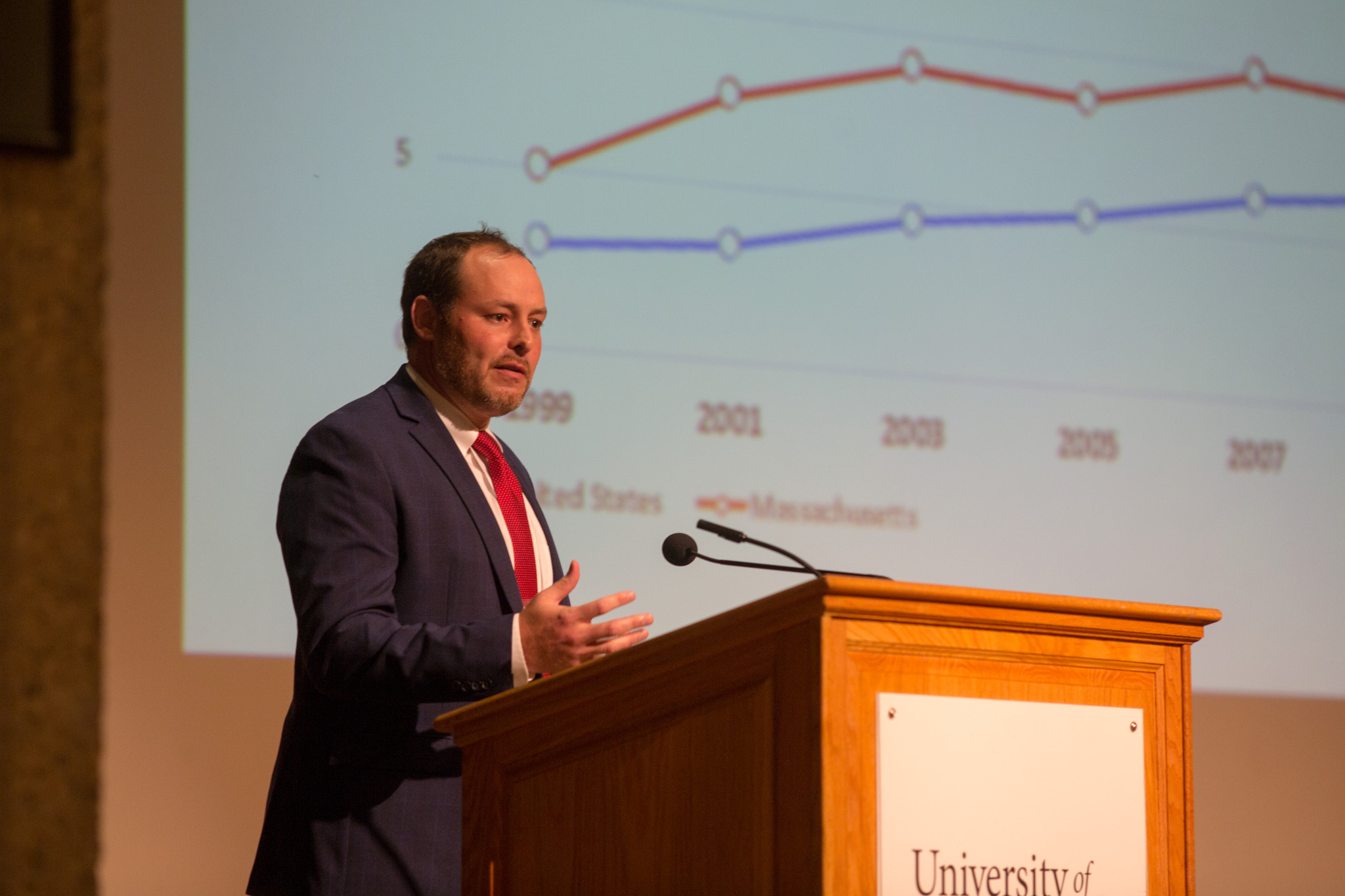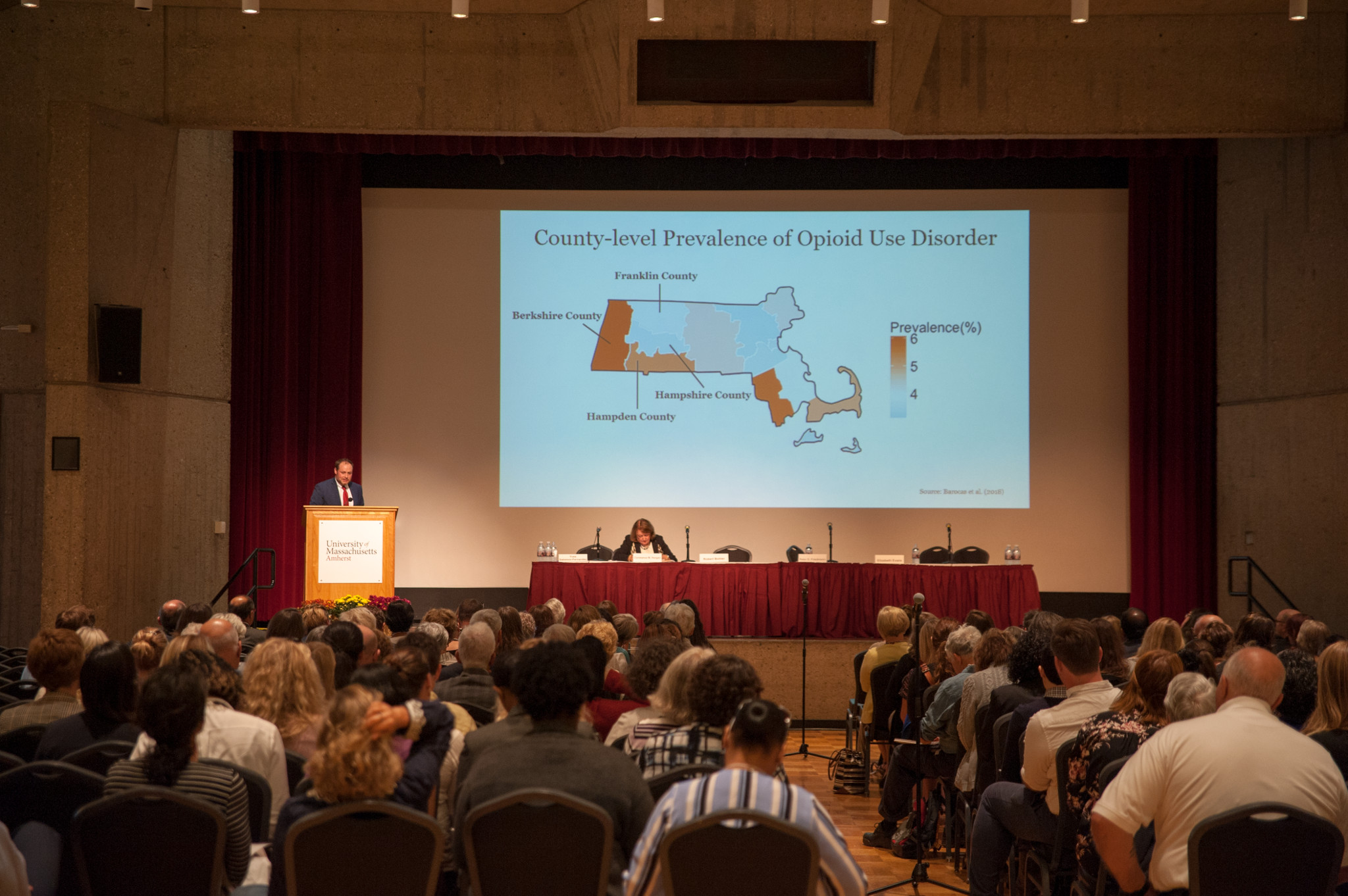As the opioid epidemic continues to devastate communities across the Commonwealth, a new report released today details the unique challenges faced by small and rural communities in Western Massachusetts in combatting the disease and offers recommendations for addressing the problem in this region.
The report, Addressing the Opioid Crisis in Small and Rural Communities in Western Massachusetts, issued this morning by the Massachusetts Health Policy Forum (MHPF), concludes that no single opioid policy will make a substantial impact on the crisis. It suggests as most effective a combination of evidence-based policies that work together to prevent, treat and mitigate the effects of opioid use disorder (OUD), and are specific to the area.
The MHPF report, in partnership with the University of Massachusetts Amherst School of Public Health and Health Sciences, the Blue Cross Blue Shield of Massachusetts Foundation, RIZE Massachusetts Foundation, Baystate Health and researchers from the Institute for Behavioral Health at Brandeis University’s Heller School for Social Policy and Management, found that while overdose deaths due to opioids have decreased in the Commonwealth as a whole, Western Massachusetts has experienced a sharp increase. After a 2017 decline in deaths in all four Western Mass counties (Hampshire, Berkshire, Franklin and Hampden), the region saw a 73 percent increase in opioid overdose deaths in 2018.
“This report gives us important insight into the hurdles Western Massachusetts and rural communities face in combatting the opioid epidemic,” said Julie Burns, President and CEO of RIZE Massachusetts Foundation. “There is incredible work being done already, and RIZE looks forward to continuing to support community-based efforts to address these challenges.”
The escalation in opioid-related overdose deaths in Western Massachusetts is significant and concerning. There is a higher prevalence of OUD in some counties, higher opioid prescribing in all four counties compared to the state, and a lower presence of fentanyl in overdose deaths before 2018 compared to the rest of the state. Interviews and preliminary data suggest an increase in fentanyl in 2018, which has likely played a significant role in the recent increase of overdose deaths in this region of the state. The potential tragedy is that, should the presence of fentanyl continue to increase in the illicit drug supply, the region is likely to see a corresponding spike in the number of fatal and nonfatal overdoses if a range of evidence-based strategies are not implemented.

This morning’s event featured a discussion of the new report with authors Constance Horgan, ScD, Professor and Director at the Institute for Behavioral Health, and Robert Bohler, MPH, PhD Student, Institute for Behavioral Health, Heller School for Social Policy and Management, along with Peter D. Friedmann, MD, MPH, DFASAM, FACP, Chief Research Officer, Baystate Health, Associate Dean for Research, UMMS-Baystate and Elizabeth Evans, PhD, MA, Assistant Professor, Department of Health Promotion and Policy, School of Public Health and Health Sciences, University of Massachusetts Amherst.
“Over the past decade of work on substance use disorder at the Institute for Behavioral Health we have never been so impressed as with the passion, dedication and commitment of folks in Western Mass. on the opioid issue,” Horgan said. “We hope that highlighting some of these efforts and pulling together the latest evidence-based solutions will help turn the tide on this crisis.”
“Although the Commonwealth has seen a modest decline in opioid-related deaths, in Western Massachusetts deaths from opioid overdoes continue to grow,” said Dr. Mark A. Keroack, President and CEO, Baystate Health. “Baystate Health is the largest healthcare provider and largest employer in the region – and we feel the impact of the opioid crisis among the small urban cities and towns and rural areas we serve. As we have already experienced as a region and a Commonwealth, it is only through our collaborative work and our care for others that we will see further and hopefully dramatic reductions in this epidemic in the near future. Today’s forum shed an important light on the urgent need to address the opioid crisis through the lens of the unique challenges and opportunities that exist in Western Massachusetts.”
Following the presentation, a stakeholder panel discussed the specific challenges faced by small and rural communities and innovative approaches underway to tackle the crisis. Panelists included Debra L. McLaughlin, Coordinator, Opioid Task Force of Franklin County and the North Quabbin Region; Berkshire County District Attorney Andrea Harrington; Ruth A. Potee, MD, Director of Addiction Services, Behavioral Health Network; Liz Whynott, Director of Harm Reduction, Tapestry Health; and Deirdre Calvert, MSW, LICSW, Director, Bureau of Substance Abuse Addiction Services, Massachusetts Department of Public Health.
“Our community has stated loud and clear that they want a more effective, health-based approach to prevention and treatment for substance use disorder,” Harrington said. “The Berkshire District Attorney’s office is answering that call by working across the community to create a health care model focused on treatment and harm reduction as opposed to arresting our way out of the drug problem. We are recognizing substance use disorder as a disease and are expanding on recognized best practices for treatment. I am honored and excited to join in the Mass Health Policy Forum and to collaborate on expanding access to effective treatment here in Western Massachusetts.”
The forum was hosted by the University of Massachusetts Amherst School of Public Health and Health Sciences.
“We know that rural populations are disproportionately affected by opioid use disorder,” said Dr. Elizabeth Evans, Assistant Professor in the Department of Health Promotion and Policy in the School of Public Health and Health Sciences at UMASS. “Massachusetts has a history of leading the way in improving treatment for opioid use disorder in vulnerable populations and understanding the high risk of fatal overdose that individuals with this condition face. This forum provides an exciting and much-needed opportunity to learn from community stakeholders, see where they have needs and help address them.”
Western Massachusetts is a large region comprised of urban, suburban, and rural communities with varied characteristics and challenges. These challenges vary by county and/or community, but they establish a foundation of the barriers present in Western Massachusetts that must be overcome by best practices and effective policy to mitigate the opioid crisis. Challenges include access to transportation, socioeconomic distress, access to treatment, isolation, trauma, housing, acquiring data, and stigma.
Transportation was cited as a significant challenge to treating OUD in Western Massachusetts, especially in the context of poverty and other socioeconomic vulnerabilities. Many of the public transportation systems in Western Massachusetts do not operate on evenings or weekends and, sometimes, a person must navigate two different public transportation services to access services.
Although the opioid crisis affects people of all income levels, lower-income groups are disproportionately affected. All of the counties in Western Massachusetts have an income per capita that is significantly less than the state average.
While there are many barriers to treatment, there are positive steps being taken by a broad coalition of stakeholders to overcome them. Interventions are being advanced by regional coalitions, people in recovery and recovery allies, the criminal justice system, harm reduction specialists, healthcare systems, community health centers, providers, and governmental organizations and occur within a continuum of care that includes prevention, early intervention, treatment, recovery, and harm reduction.
“People who use drugs face incredible societal stigma, which makes hiding one’s drug use extremely common. Isolation puts people at higher risk of dying from an overdose, which is why Tapestry staff see relationships with participants critical to keeping people alive and improving health,” said Liz Whynott, Director of Harm Reduction at Tapestry Health. “People who use drugs come to Tapestry’s syringe service programs to find a safe place where they can be truthful about their own drug use and receive services that they need in that moment, including access to Narcan and sterile syringes. While we also provide regular referrals to substance use treatment and support people in their efforts to be completely abstinent from drugs, we also recognize that any positive change an individual makes to improve their own health is a step in the right direction.”
Today’s report includes the following recommendations to address this growing behavioral health crisis in Western Massachusetts:
- Increase and improve the addiction treatment workforce through funding initiatives and mandate education on addiction and trauma-informed care to individuals that will work in any capacity with the substance use disorder (SUD) population.
- Support and expand municipal-based coalitions and strengthen county-based coalitions.
- Continue interventions that lead to cautious opioid prescribing practices.
- Increase capacity of medications for opioid use disorder (MOUD) and increase MOUD initiation at vital touchpoints.
- Increase treatment role of the criminal justice system.
- Provide a robust and comprehensive treatment and recovery continuum of care that is supported by payors.
- Use low bandwidth technology as a cost-effective way to deliver services to underserved areas.
- Support the increased distribution of naloxone and other harm reduction strategies.
- Provide funding that is sustainable for the entire continuum of care.
- Address upstream factors related to OUD.



